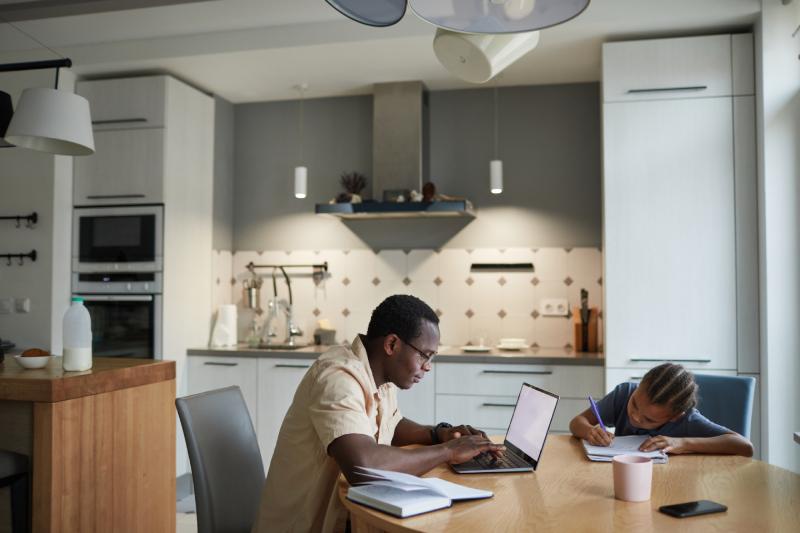The great thing about working for an employer is that bills and overheads are their concern. Go self-employed and run your own business, and suddenly the responsibility for managing, reporting and paying utility bills is all on you.
Many self-employed people work from home, enjoying the flexibility without needing to pay for extra work space, but this does mean household bills can mount in relation to business use.
Claiming allowable expenses on home utilities directly related to your business operations is an efficient way to reduce your tax bill – but what about VAT?
Here, we take a look at the kinds of bills you can reclaim VAT on if you run a VAT-registered business from home.
Claiming VAT on bills when working from home
The great news is that you can reclaim VAT on certain costs when working from home, provided your business is VAT-registered.
This means the cost in question needs to be directly related to the operation of your business, even if it’s only part of the full bill or expense.
For example: You have five rooms in your house and your home office is one of them, so your home workspace takes up roughly 20% of your floor space. This means you can reclaim VAT on 20% of applicable bills and expenses.
Plus, if your business incurs additional costs as a result of you working from home, whether partially or full-time, you can reclaim the VAT on these too, along with a proportion of your home workspace running costs.
This includes things like:
- Office furniture
- Some decoration costs
- Security expenses associated with protecting sensitive data
- Some office cleaning and maintenance costs
You will need to be able to prove that the costs you’re looking to reclaim VAT on are a ‘fair and reasonable’ part of running your business. The best way to do this is by maintaining thorough financial records and storing valid VAT invoices, receipts, and other relevant paperwork.
How do I reclaim VAT on work-from-home expenses?
You can claim VAT on allowable expenses through your VAT submission, but there are a few specific things to know depending on how your business is structured.
Limited companies and directors
If you are registered as a limited company and want to reclaim VAT on qualifying home-work expenses, you need to ensure the costs are paid by the business and in the business’s name. This is because the company is a separate legal entity to you as an individual, so it can be a bit complicated.
You might instead claim your expenses back as a company director, with the company reimbursing you for the cost.
Sole traders and partners
If you are registered as a partner or sole trader, HMRC counts your personal finances the same as your business finances. So, you’ll just need to be able to identify and prove what proportion of costs incurred are directly business-related for VAT purposes.
Don’t forget: In order to reclaim VAT on bills if you work from home, you need to be a VAT-registered business. This applies no matter how your business is registered or legally structured.
Registering for VAT
VAT registration is compulsory if your taxable turnover meets the legal threshold, which is currently £90,000 within a 12-month period.
You can register for VAT online or by post and the process is pretty simple. You’ll just need to make sure you have the following to hand before you start:
- Your Government Gateway login details
- Business registration details
- Business bank account details
- National Insurance number or Unique Taxpayer Reference (UTR) number
If VAT registration isn’t mandatory for you just yet, there is still an option for you to register for VAT voluntarily.
Voluntary VAT registration
Some business owners choose to register for VAT voluntarily, even if their current VAT taxable turnover hasn’t yet reached the official threshold of £90,000.
There are a number of reasons why a business owner might opt for voluntary VAT registration, including:
- If you pay for goods or services with VAT added on top (e.g. accountancy or legal fees) you can claim back the VAT you pay. This is known as ‘input tax’
- If your input tax exceeds your ‘output tax’ (the VAT you’ll be required to charge your own customers), you can reclaim the difference. So, if you pay VAT on a regular basis but don’t charge it very often, voluntarily VAT can be a great way to become more tax-efficient.
- Being VAT-registered can help make a business appear larger, more established, and more reputable. This gives new and existing customers confidence in you and also helps you stand out against the competition.
- You are able to backdate claims for goods for up to 4 years and services for up to 6 months prior to your VAT registration date once you’re registered, as long as you’ve kept detailed records and the necessary paperwork.
Sometimes, your accountant may even recommend that you register for VAT before it becomes compulsory.
However, it is important to note that if you do choose to register for VAT voluntarily, you will still need to follow the same processes and comply with the same deadlines as those under compulsory VAT registration.
In other words: just because voluntary VAT registration is your choice doesn’t mean this gets you off the hook with filing VAT returns.
So, if your VAT taxable turnover is still below the threshold and there’s no real reason for you to register for VAT, you might prefer to save yourself the headache – at least for the time being.
Are you looking for more expert business support? Head over to our info hub for more news and helpful resources.









Leave a Reply